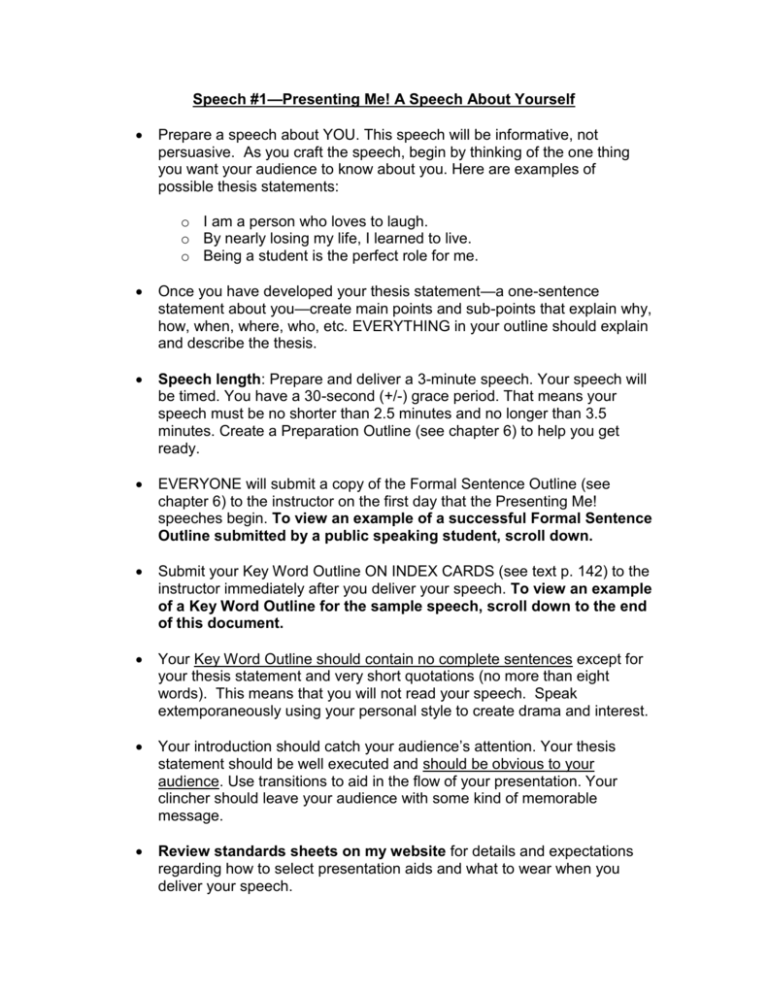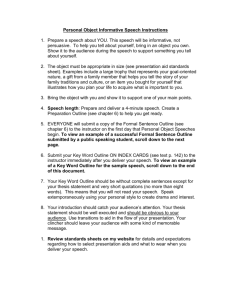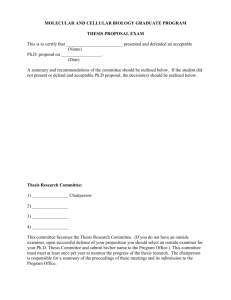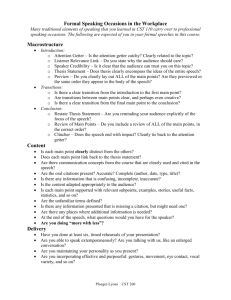Personal Speech - Bakersfield College
advertisement

Speech #1—Presenting Me! A Speech About Yourself Prepare a speech about YOU. This speech will be informative, not persuasive. As you craft the speech, begin by thinking of the one thing you want your audience to know about you. Here are examples of possible thesis statements: o I am a person who loves to laugh. o By nearly losing my life, I learned to live. o Being a student is the perfect role for me. Once you have developed your thesis statement—a one-sentence statement about you—create main points and sub-points that explain why, how, when, where, who, etc. EVERYTHING in your outline should explain and describe the thesis. Speech length: Prepare and deliver a 3-minute speech. Your speech will be timed. You have a 30-second (+/-) grace period. That means your speech must be no shorter than 2.5 minutes and no longer than 3.5 minutes. Create a Preparation Outline (see chapter 6) to help you get ready. EVERYONE will submit a copy of the Formal Sentence Outline (see chapter 6) to the instructor on the first day that the Presenting Me! speeches begin. To view an example of a successful Formal Sentence Outline submitted by a public speaking student, scroll down. Submit your Key Word Outline ON INDEX CARDS (see text p. 142) to the instructor immediately after you deliver your speech. To view an example of a Key Word Outline for the sample speech, scroll down to the end of this document. Your Key Word Outline should contain no complete sentences except for your thesis statement and very short quotations (no more than eight words). This means that you will not read your speech. Speak extemporaneously using your personal style to create drama and interest. Your introduction should catch your audience’s attention. Your thesis statement should be well executed and should be obvious to your audience. Use transitions to aid in the flow of your presentation. Your clincher should leave your audience with some kind of memorable message. Review standards sheets on my website for details and expectations regarding how to select presentation aids and what to wear when you deliver your speech. Personal Object Formal Sentence Outline My Confidant, My Therapist . . . My Journal Introduction I. Attention catcher: I have found the perfect method for relieving stress, releasing your pent up emotions, and liberating your inner most secrets. II. Listener relevance link: Everyone needs someone to confide in, someone they can trust, and someone who will not judge them. My someone is my journal. III. Speaker credibility statement: I have been writing since I was younger and have noticed that it is the easiest way to privately express my thoughts. IV. Thesis Statement: Writing in my journal defines what kind of person I am. V. Preview: Today I will explain to you why I keep a journal, how it helps me, and how interesting it can be. Body I. First main point: I keep a journal because I like to keep my life private. a. I am an only child and consider myself to be a private person. I have turned to writing as a source of release when things around me have become too chaotic and perhaps too personal to share with others. b. I also like to write down my thoughts because I know I can be truthful and completely honest. I don’t have to worry about what I wrote because I can rely on the fact that I will be the only one to read it. Transition: Writing not only allows me to keep things private but it also helps me to deal with life. II. Second main point: Writing is like therapy. a. Writing helps me solve my problems. When you write you get everything out in the open and it allows you to cope with situations and move on. You let go of whatever incident is holding you back and bringing you down. b. I have also learned a lot about myself from writing. I write down things that I never knew were even on my mind. I have become more aware of what my concerns are and interests as well. Transition: Not only is it helpful to write but keeping a journal can be interesting to look back on. III. Third main point: Keeping a journal is like looking through a yearbook of your life. a. Writing is not only a way to relieve stress in my life but it is also a way to keep a record of what is important to me at the moment. I have noticed how interesting it can be to reflect on things in my past and to realize how my priorities change. b. In order to write my speech I had to look back through my journal and see why I enjoyed to write. Doing this brought back memories and it also surprised me to see how things have changed in my life the last couple of years. Conclusion I. Thesis restatement: Now you know that writing in my journal defines what kind of person I am. II. Main point summary: I told you why I like to write, how it helps me, and how it can be interesting to keep a journal. III. Clincher: I encourage you to write down your thoughts the next time you are feeling creative and experience how helpful it can be. Personal Object Key Word Outline My Confidant, My Therapist . . . My Journal (this speaking outline originally appeared on index cards) Introduction Attention catcher: Relieving stress Innermost secrets Listener relevance link: Need someone to confide in Journal Speaker credibility statement: Writing since young Privately express thoughts Thesis Statement: Writing in my journal defines what kind of person I am. Preview: Why I keep a journal How it helps me How interesting it can be Body First main point: Keep journal … keep life private o Only child o Writing = release when things become too chaotic o Can be truthful and honest o I’m only reader Transition: Writing = keep things private and deal with life Second main point: o Writing = therapy. o Solves problems o Allows you to cope o Learn about self Transition: o Writing…helpful & interesting--yearbook Third main point: o Journal = yearbook of life. o Keep record of what is important o Reflect on my past o For speech --looked through my journal o Brought back memories o See changes Conclusion Thesis restatement: o Now you know that writing in my journal defines what kind of person I am. Main point summary: o Why I like to write o How it helps o How it can be interesting Clincher: o Write your thoughts!









